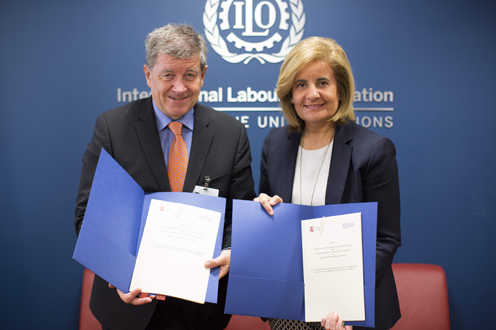Meeting with Director-General of International Labour Organization (ILO)
Spain ratifies international protocol on forced labour and consolidates its position as the country that has ratified the most international conventions with the ILO
News - 2017.9.21
Forced labour is "a serious human rights violation" that relates to "all work or service required of an individual under the threat of any form of punishment and to which end said individual did not offer his or her services voluntarily".
This protocol, adopted in Geneva in 2014, complements the 1930 Forced Labour Convention, and adds new elements such as tackling its root causes to eliminate any form of slavery. The latest estimates from the ILO indicate that more than 21 million men, women and children live in conditions of slavery, representing 0.3% of the world's population.
The protocol requires that countries guarantee the liberation, recovery and re-adaptation of victims of modern slavery; that they enact legislation to prevent forced labour and strengthens labour inspections and other services that protect workers from exploitation.
The protocol guarantees victims access to legal action and redress even if they are not legal residents in the country they work. Government must sanction abusive and fraudulent practices of contractors and employment agencies.
At present, this protocol has been signed by 18 countries: Argentina, Czech Republic, Cyprus, Denmark, Estonia, Finland, France, Iceland, Jamaica, Mali, Mauritania, Niger, Norway, the Netherlands, Panama, Poland, the United Kingdom and Sweden.
By ratifying this agreement, Spain consolidates its position as the country that has ratified the most conventions, having ratified all of the fundamental conventions and governance conventions.
Non official translation





